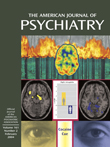Geriatric Psychiatry Versus General Psychiatry Inpatient Treatment of the Elderly
Abstract
OBJECTIVE: The authors compared the clinical treatment given older psychiatric inpatients on a geriatric psychiatry unit and a general psychiatry unit. METHOD: The charts of 50 randomly selected general psychiatry inpatients over the age of 65 years and 50 inpatients from the geriatric psychiatry unit who were matched for age, gender, and primary diagnosis were reviewed. RESULTS: Significantly greater percentages of older inpatients treated on the geriatric psychiatry unit received complete organic medical workups, structured cognitive assessment, aging-sensitive aftercare referral, and monitoring of psychopharmacological side effects and blood levels than comparable patients on a general psychiatry unit. CONCLUSIONS: Geriatric psychiatry subspecialty inpatient care appears to be associated with distinct clinically relevant assessment and treatment advantages. Continuing geropsychiatric education of general psychiatrists is indicated.



